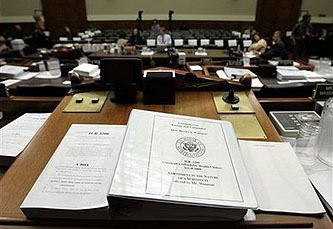 The path forward for healthcare reform is now widely agreed on: pass the existing Senate bill through the House, and then tack on a package of changes negotiated between the House and Senate that can be passed through both chambers on a simple majority vote via the budget reconciliation process. Simple. Except for one thing: who goes first, and what gets passed when? Michael Scherer outlines the process:
The path forward for healthcare reform is now widely agreed on: pass the existing Senate bill through the House, and then tack on a package of changes negotiated between the House and Senate that can be passed through both chambers on a simple majority vote via the budget reconciliation process. Simple. Except for one thing: who goes first, and what gets passed when? Michael Scherer outlines the process:
The Senate does not want to go first because Republicans will be able to bottle up the reconciliation process, delaying the vote and making for another ugly sausage making spectacle that Americans hate to watch. If reconciliation takes too long, the thinking goes, then the House will never act, and the whole health care deal will die. But if the House goes first by passing the Senate bill, and the president signs it, then the incentive for Republicans to bottle up reconciliation would be diminished. Health care reform would, at that point, already be law. The horse would be out of the barn. Republicans would then be obstructing fixes to the law that would make the bill, arguably, better by getting rid of stuff like the “cornhusker kickback,” a much tougher proposition.
Here is where it gets tricky: The House is not going to vote on the Senate bill (even with a separate package of amendments to match the Senate’s reconciliation) until it is dead certain that the Senate will act. So how could those assurances be arranged? With the help of C-Span cameras, of course, or perhaps a letter from 51 Democrats vowing to pass reconciliation come hell or high water. Once the letter is read on the nightly news, the House can act, and suddenly the pressure would be on the Senate Republicans. With health care already law, the GOP will have to decide whether or not to spend weeks gumming up the Senate to delay some amendments to that bill.
Without a doubt, the whole thing is a long shot. It’s not clear that Pelosi has the votes she needs, but if she can get to 217, then it is unlikely to be all that difficult to get the Senate to 51, despite Republican carping over process. There is a path. It’s tiny. But it’s there.
Of course, Scherer has skipped a step here: coming up with the reconciliation compromise in the first place. It has to be something that can still get 51 votes in the Senate — which probably isn’t too hard — and a majority in the House. And since abortion language can’t be changed via reconciliation (it has nothing to do with the budget), that means the House majority has to suck it up and accept the Senate’s abortion language. Considering that the Senate language is pretty stiff, that shouldn’t be too hard, but if anti-abortion Dems are casting around for an excuse to vote No anyway, that would be a pretty handy one.
Anyway, I keep reading that the House and Senate hate each other’s guts these days, which is going to make this whole process difficult. That seems crazy to me, since you’d think a bunch of professional politicians would have a pretty hard-boiled view of the institutional issues that affect both chambers. But in the same way that inter-party relationships have gotten far more personal and vitriolic since the Gingrich revolution, apparently so have intra-party relationships. Obama’s got his work cut out for him.

















